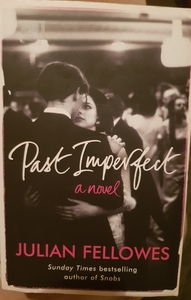You need to sign in or sign up before continuing.
Take a photo of a barcode or cover
I think I need to sit with this book before deciding a rating. It was so entertaining…. Until the last section which had me feeling very mixed emotions.
emotional
mysterious
reflective
sad
medium-paced
Plot or Character Driven:
Character
Strong character development:
Complicated
Loveable characters:
No
Diverse cast of characters:
No
Flaws of characters a main focus:
Yes
I read this book as it was the latest Book Club choice for sew make believe and I was looking forward to it since it comes from the writer of Downton Abbey, one of my current faves (and probably the only proper UK TV I am watching - The X Factor and Homes Under The Hammer don't count!).
It is about the reunion of two frenemies who back in the Sixties were part of the London debutante scene and lived a privileged and whirlwind life in their youth. One of these men is dying and has received a mysterious letter which suggests he has a child and therefore heir to his considerable fortune. The other has been asked to find out which of his several conquests is the mother so that the child can be identified and found.
Fellowes's writing is so vivid that it takes you deep into this world and despite struggling to find any character which has a redeeming quality (there are a couple but that is all), I found the book totally riveting. My one criticism is that the descriptions are at time so detailed that it reads more like an historical account and as such, the pace of the story was slowed down while the scene was painstakingly set and the context elucidated.
You can read more about our club discussion here. I think would read more of Fellowes's novels if the opportunity presented itself. He may be a bit of a toff but he is an excellent writer.
It is about the reunion of two frenemies who back in the Sixties were part of the London debutante scene and lived a privileged and whirlwind life in their youth. One of these men is dying and has received a mysterious letter which suggests he has a child and therefore heir to his considerable fortune. The other has been asked to find out which of his several conquests is the mother so that the child can be identified and found.
Fellowes's writing is so vivid that it takes you deep into this world and despite struggling to find any character which has a redeeming quality (there are a couple but that is all), I found the book totally riveting. My one criticism is that the descriptions are at time so detailed that it reads more like an historical account and as such, the pace of the story was slowed down while the scene was painstakingly set and the context elucidated.
You can read more about our club discussion here. I think would read more of Fellowes's novels if the opportunity presented itself. He may be a bit of a toff but he is an excellent writer.
I read this after watching Downton Abbey and discovering I have an obsession with period pieces. As a whole, I was disappointed. It read more like a television show than a book, which is why I suppose Julian Fellowes had more luck as a show-runner than an author. The characters were plentiful but a bit repetitive. However I enjoyed the journey and reading of a life i know nothing about.
Honestly, I just finished this because I wanted to know the answer to if there was a child. I feel like there's a kernel of an interesting story here, but this isn't it. All the people are pretty insufferable too...
An entertaining read with an amoureux detective twist, Past Imperfect revolves around one big mystery: who is the mother of the only heir to Damian Baxter's fortune? It is not the answer to that question which is the most interesting part of the book, nor is it the revealing moment where one discovers what happened at "that ghastly evening in Estoril". What makes this novel worth reading are, as with Snobs, the vivid descriptions of a world unknown to many of us: the English upper classes' circle in which debutantes, their families and friends strut their stuff during the social season. A London tradition now no longer in use, the Season is already on its last legs in 1968, when most of the novel takes place. The anonymous narrator introduces his handsome Cambridge friend Damian (who is definitely not a toff and therefore does not belong there, according to the unwritten rules) into the upper circles of society and has to bear the consequences of this.
As an insider with first hand experience of life in the upper classes, Julian Fellowes is able to evoke the atmosphere, the energy and the morals of the day with a liveliness which makes you feel as if you'd been part of the whole thing yourself. His narrator takes you by the hand through the Season of 1968 and all its upsets and drama. Mayhem ensues and some lives take an unexpected (or perhaps rather the opposite) turn.
On the whole, this is an insightful book, well-written and full of observations about social expectations and the way people tend to behave when they belong to a certain kind of family or social circle. Yes, stereotypes are not far away, but that is perhaps because they tend to be based on truth and in this case, few people like to stick to the traditional ways as much as the upper classes whose position is threatened by big changes in society.
The only problem I had with this book was in distinguishing between some of the the female characters. Apart from Serena and Lucy, I had problems with the "who's who". Candida, Joanna, Terry, Dagmar, it was at times hard to keep track of which one of them was the attractive one, the one with the crazy stepmother, the one with the desperate social climbing mother, the outsider, the niece of... There seem to be quite a lot of crazily ambitious mothers involved who do not really care all that much about what their daughters want or what they could achieve, but instead focus solely on what could improve their own social position. Scheming, plotting and desperate pushing seem to be all that these matriarchs are interested in. But I had difficulties matching the right mother to the right daughter, which made the story difficult to follow at times. But hey, that's life in the upper circles, innit?
As an insider with first hand experience of life in the upper classes, Julian Fellowes is able to evoke the atmosphere, the energy and the morals of the day with a liveliness which makes you feel as if you'd been part of the whole thing yourself. His narrator takes you by the hand through the Season of 1968 and all its upsets and drama. Mayhem ensues and some lives take an unexpected (or perhaps rather the opposite) turn.
On the whole, this is an insightful book, well-written and full of observations about social expectations and the way people tend to behave when they belong to a certain kind of family or social circle. Yes, stereotypes are not far away, but that is perhaps because they tend to be based on truth and in this case, few people like to stick to the traditional ways as much as the upper classes whose position is threatened by big changes in society.
The only problem I had with this book was in distinguishing between some of the the female characters. Apart from Serena and Lucy, I had problems with the "who's who". Candida, Joanna, Terry, Dagmar, it was at times hard to keep track of which one of them was the attractive one, the one with the crazy stepmother, the one with the desperate social climbing mother, the outsider, the niece of... There seem to be quite a lot of crazily ambitious mothers involved who do not really care all that much about what their daughters want or what they could achieve, but instead focus solely on what could improve their own social position. Scheming, plotting and desperate pushing seem to be all that these matriarchs are interested in. But I had difficulties matching the right mother to the right daughter, which made the story difficult to follow at times. But hey, that's life in the upper circles, innit?
I was very interested in all the ways I could tell this was written by a man. And, I still enjoyed it!
emotional
funny
informative
mysterious
reflective
sad
slow-paced
Plot or Character Driven:
Character
Strong character development:
Yes
Loveable characters:
Complicated
Diverse cast of characters:
Complicated
Flaws of characters a main focus:
Yes
emotional
mysterious
reflective
sad
slow-paced
Plot or Character Driven:
Character
Strong character development:
Yes
Loveable characters:
Complicated
Diverse cast of characters:
No
Flaws of characters a main focus:
Yes
Positiivista kirjassa oli ihanan utopistisesti kuvattu aateliston elämä, ja sitä kuvailevan tekstin välistä tahatonkin komediallisuus. Valitettavasti jatkuva nostalgia omaan nuoruuteen kätkettynä lauseisiin "kaikki oli paremmin Britannassia 1968" tuntui ensin vitsiltä, ja kun tajusin päähenkilön tarkoittavan sitä tosissaan, se tuntui tragikoomiselta rikkaan aatelisen miehen etuoikeuksiensa perään itkemiseltä (sinällään alkuun siis ihan hauskaa mutta lopen aika rasittavaa). Vaikka juoni oli vetävä, lopputulos oli jossain määrin ennalta-arvattava. Parhaimmat henkilöt kirjassa olivat Kieran ja Damian, ja silti heidän mollaamisensa oli loputonta. Lopputulos oli ihan viihdyttävää kolmen tähden kirjallisuutta genressään, mutta toivottavasti kirjoittaja ennen seuraavaa teostaan tutustui esim. lordi Byronin elämänkertaan, joutenolo ja palveltavana oleminen ei nimittäin faktakirjallisuuden puolella kuulosta tosiaan siltä, minkä Iso-Britannian aatelisto osasi parhaiten.




